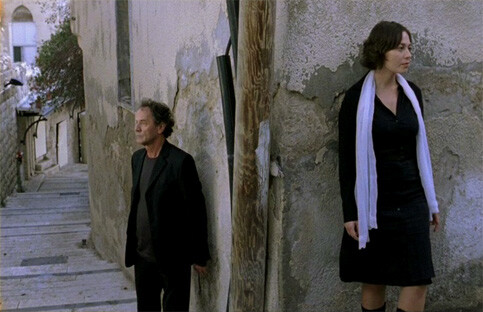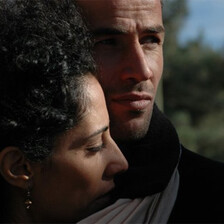The Electronic Intifada 13 April 2010

Mohammad Bakri and Mira Awad in Michel Khleifi’s Zindeeq.
Michel Khleifi, the celebrated director of Wedding in Galilee, turns the camera inward in his 2009 feature film, Zindeeq (the meanings of which include “atheist” or “freethinker”), featured at the opening of the annual Chicago Palestine Film Festival this Friday. It is Khleifi’s first feature film in 14 years; his most recent film was the 2003 documentary he filmed in collaboration with Eyal Sivan, Route 181: Fragments of a Journey in Palestine-Israel.
Zindeeq’s protagonist, never referred to in the film by name and performed by the high-profile Palestinian actor Mohammad Bakri, is an expat filmmaker from Nazareth who is back in his homeland to interview refugees of the 1948 expulsion, or Nakba, in the West Bank. Unable to reach his sister’s Nazareth home after a day of filming, because his nephew has killed a man and every male in the family is subject to vendetta, the filmmaker becomes an exile within his homeland as one hotel after another tells him he isn’t welcome to stay.
At one point, after a sympathetic clerk attempts to convince his boss to let a room to the filmmaker, our protagonist asks why he was refused. The young clerk simply stares at him. Perhaps the protagonist really understands the unspoken reason of why he can find no room in Nazareth while partying Israeli soldiers and Arab elite face no such prohibition, but the viewer is not given enough cues to appreciate why.
While the film is dripping with symbolism, the narrative is too thin and the dialogue too sparse for the protagonist’s journey to be transcendent. Meanwhile, other narrative devices confuse rather than clarify. The protagonist is constantly filming or viewing his documentary footage on his handheld camcorder, but sometimes the camera serves a prop for a dream sequence or memory flashback. However, the lack of distinct contrast between the different types of sequences makes it a challenge to follow the narrative or experience the main character’s personal breakthrough.
Likewise, the film is heavy on metaphor and Biblical allusions that sometimes overly abstract the narrative. At other times however the symbolism is more successful. During his night journey the protagonist finds the wells of the Virgin Mary’s spring in Nazareth dried up and a drunk man on the street offers him a drink from his bottle, which the initially grateful protagonist learns the hard way is full of alcohol. The amused drunk lucidly explains that the spring dried up long ago, and now the Israeli state water company Mekorot sells water to the church. A weary traveler will find alcohol where a spring once flowed, Jesus’s hometown is patrolled at night by roving bands of thugs, and undocumented laborers including children squat in abandoned homes in fear of arrest in Khleifi’s contemporary Nazareth.
Parallel to his attempt to find a place to rest his head, the protagonist is on a quest to understand the actions of his parents’ generation. As though he were a doctor interviewing a patient about her symptoms, he interviews a refugee in Ramallah about the circumstances of her exile from Lydd, in what is now considered Israel. However, the real burning question for the protagonist is why his parents remained in Nazareth during the 1948 Nakba.
Intertwined with his coming to terms with his parents’ history is the protagonist’s reconciliation with his own past. The protagonist’s assistant and romantic interest, Racha, becomes a revelation to him and his peace seems to depend on her forgiveness of his carnal sins. But the contrast between the character’s more spiritual connection with Racha and the many other women who are more available to him sexually is taken for granted, a problem that dogs the narrative. (Racha’s character is performed by Mira Awad, who last year received a letter from co-star Bakri amongst other Palestinian artists in Israel asking her to not take part in the Eurovision contest in which she was co-representing Israel. Last week she made headlines again when she withdrew from the UK Zionist Federation’s Israel Independence Concert in London, denying reports that she canceled because of threats against her and her family.)
More rich than the thin Racha plot-line however is the treatment of intra-Palestinian strife, and the portrayal of a society where neighbors “have no time” in the sense that no matter how much time passes, neighbors cannot become strangers, while at the same time the action of one member can plunge a whole family into violence. Some of these internal contradictions are broached in Rachid Masharawi’s Laila’s Birthday (2008) (which also featured Bakri behind the wheel of a car for much of the film, this time playing a taxi driver).
Likewise, Khleifi is not the first to approach the subject of the perceived failure of the 1948 generation; fellow Nazarene filmmaker Elia Suleiman’s Chronicle of a Disappearance similarly follows an unnamed protagonist’s exile within the homeland and shows his parents falling asleep in front of the TV as the Israeli flag flickers on the screen and the national anthem plays on. Where Suleiman’s Chronicle is a series of vignettes with sharp edges, Khleifi’s nighttime scenes are more blurred at the edges, giving it a dreamy, even languid tone.
A further comparison to another recent Palestinian feature film helps distinguish Khleifi’s production and demonstrate the breadth of style of current Palestinian filmmaking. Like Annemarie Jacir’s protagonist Soraya in Salt of This Sea (2008), Khleifi’s main character is a Palestinian living in the diaspora returning to his homeland. Though neither film ties up their narratives in a neat bow, Jacir’s film uses popular Palestinian symbolism such as the remains of destroyed villages to make a cinematic case for the Palestinian cause, while Khleifi’s film uses a whole other visual language to approach another facet of the 1948 Nakba. That the two films come one year after another is a tribute to Palestinian filmmaking and storytelling — reaffirmed with a wink when Khleifi’s protagonist, showing a boy from Gaza begging in the streets of Nazareth how to hold a camera, says, “We, we make films, not wars.”
For more information on the Chicago Palestine Film Festival visit http://palestinefilmfest.com/.
Maureen Clare Murphy is managing editor of The Electronic Intifada.




